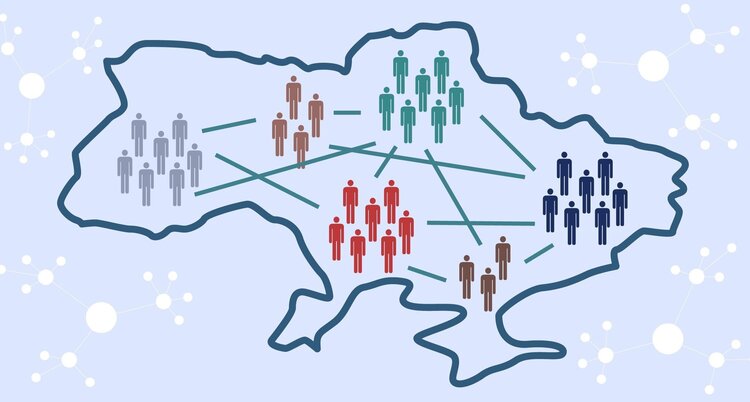Entrepreneurial communities
too much coordination and planning can kill incentives and creativity of local development agents

It's been more than 30 years since people in former socialist countries decided they didn't want central economic planning anymore. Because it just didn't work.
It’s amazing that, after so many years, many still believe that there is a need for central planning of regional and local development. While we easily agree that there is no need for some authority telling economic agents what their business should be, many still think that there must be "somebody" telling local communities what their projects and priorities should be.
This kind of thinking appeals to many, not only in Ukraine.
We all love things to be organized, coordinated and planned. But too much coordination and planning can kill incentives and creativity of local development agents.
There is another possible way of thinking about development, a more promising one in my opinion. It is a kind of thinking that builds on the underlying motivation and reasoning which inspired the ambitious decentralization reform in Ukraine. One could say that the drive for decentralization was about building trust between the state level and sub-national level authorities and stakeholders. The benefits of giving local communities more resources, responsibilities and room for independent action were demonstrated at the onset of Russian aggression, when the local actors proved capable of reacting swiftly to address humanitarian, security and other unprecedented challenges. If municipalities were able to navigate their work in times of total uncertainty and death threat, most probably they will be able to use the reconstruction and development funds wisely as well.
The fundamental principle
There is one, and only one, fundamental reason for having a market economy instead of a centrally planned one. It is the belief, or trust, that people know better. Surely, entrepreneurs do not have all the information and knowledge they’d need to make infallible decision. But, unlike government and central planners, they have the motivation to find out the information they need and to make the best out of it. They are rewarded for making good decisions and they bear the cost of bad ones.
The same can be said not only of people who create small businesses and big companies, but also of those who together make a local society. Together they certainly know their needs and ambitions better than any outsider ever could, including the central government and international development organizations. If people are able to come together, deliberate and decide on community projects, they will make their lives better. If they fail, they’ll bear the cost.
So why do we allow entrepreneurial people to start almost any business they like, but at the same time think we should somehow control what projects the local communities choose to do for their own good? There is a number of false reasons, and let’s consider them one by one.

“We’re giving them money”
This seems like an argument overpowering any other consideration. The central budget, developed countries, international organizations and lenders are giving money to local communities, so they are obviously entitled to say what this money should be spent on.
But is this really so? In essence, this is the logic many parents use. We’re paying for your education, they say, so you’ll study something that we agree with. We’ll give you money only if you do what we expect from you, like helping with household chores or having good marks in school. Without going into discussion whether this is good parenting or not, let me just say that local communities are not anyone's kids. They're communities of people just as adult and reasonable as anyone else.
There are ways of giving development money to local communities without much infringement on their autonomy. In short, it means moving from project to programme based financing. In this approach, local communities, or partnerships of several communities, prepare a development programme they find best for them. The state or other donors provide financial support for a part of the programme’s implementation costs, but without any conditions about the projects it should be spent on. The use and distribution of money is left to local authorities, as long as it is spent legally and for the purpose of achieving the development programme’s results.
“Projects need to be coordinated”
Uncoordinated local projects can lead to poor services and overcapacity. If two communities want to build a bridge connecting them, they need to build it on the same spot or it will serve no purpose. If all communities decide to build a state-of-the-art regional hospital, or a university, we soon end up having too many hospital beds and study places.
There is a simple remedy for this kind of issues. Projects that can only be worthwhile if they serve several communities need to be coordinated, but at the lowest possible level higher than a single community. For example, projects like bridges and roads connecting two communities, or a waste management facility serving several of them, can be agreed between directly affected communities without any need to involve higher-level administrations and planners. Some other projects, like regional roads and hospitals, are best planned and managed at the regional level, but in consultation with local communities about their needs and expectations.
This is the essence of the famous European subsidiarity principle, so often cited but not always understood and respected.
The other side of this principle is that there are many local projects – like housing, homeless shelters, orphanages, kindergartens, primary schools, cultural institutions, community centres, recreational facilities, institutions supporting local businesses and many others – that hardly affect anyone else than the community implementing them. They should be left to their own choice.
The fact that some projects need to be coordinated does not, by itself, justify the need for a complex and strictly regulated top-down development planning. The need for coordination does not translate into the need for the central level to set priorities for the local one.
“Impulsive projects need to be avoided”
True. Nobody wants local projects to be decided in a haphazard way, starting with something today and jumping onto something else tomorrow, probably only because some consultants have proposed it, or some influential groups have pushed for it, or some others are doing it, so we need to do it too.
There is a simple cure for this as well. In EU parlance, it’s called programming. It means that individual projects, or at least most of them, need to be part of a medium-term programme explaining what will be done in the next few years, with available resources, to make progress towards generally accepted objectives such as quality of life, well-being and a strong, jobs-creating local economy.
But think of such programmes as business plans rather than a strategy or, how we like to call them, a public policy document. To use the parallel with entrepreneurship again, think of what a banker would want to know from an entrepreneur presenting their start-up idea, or a plan to expand and renew their existing company. There are essentially only three such basic questions: how much it will cost, are you able to do it, and what results you expect.
The current legislation on local development requires local communities to prepare a number of planning documents, prescribes their structure, content and preparation procedures, going far beyond the three basic questions. Moving into the direction of programme based financing, as suggested above, would be easier if these requirements were simplified and partly scrapped.

“But local communities are not entrepreneurs”
True. As much as I have pushed the parallel, there is a fundamental difference between entrepreneurs and local decision-makers. Entrepreneurs decide for themselves, while public decision-makers decide for everyone and on behalf of everyone in the community. They may take very bad decisions, motivated by their personal preferences and gain, often not bearing the cost of such decisions and the responsibility for them.
The basic answer to this issue is participation and transparency. There are many ways in which local resident can participate in decision-making, either directly or through their civil organizations. But these ways and means of participation need to be instituted and safeguarded. This is where normative acts adopted at the central level can indeed help. Not so much by prescribing procedures for public consultations, as is fashionably done today in many places, but by doing something more fundamental, that is giving citizens the rights empowering them to engage in the democratic process.
There is a number of such rights that go beyond the basic freedom of expression and association. For example, the right to demand information from public authorities or the right to participate and speak in meetings of local council committees. The complement to citizens’ rights is the obligation of authorities to disclose any information related to their service. In the world of projects, the key information is project proposals, selection and award procedures, contracts, financial records and statements, monitoring and audit reports. For the latter, there is also the need for a legal obligation of submitting financial accounts to regular independent audits.
Transparency and participation rights can greatly increase accountability of local authorities. Not overnight, by strike of the pen, but with time and only when actively used by the people.
The power of simplicity
This article started with a simple, but a very fundamental argument for giving local communities more autonomy in choosing their own development projects. It considered some of the often-heard objections to such proposals, and showed how such objections can be addressed without resorting to a top-down, centrally planned development policy.
Even if the authorities were to embrace the logic of the argument, the key question is, of course, how can we come from the current style of regional policy to the one advocated here. A good approach may be to start with small steps, experimenting in the general direction of change, seeing how it works, gaining trust and understanding for the change, and then moving faster and on a larger scale.
Some concrete proposal on how the current arrangements of the regional development policy in Ukraine could be amended and adjusted, with the purpose of evolving into the direction of a more decentralized, locally driven development policy are provided in the author’s recent study, published by the U-LEAD programme.
Janez Šušteršič is a former Minister of Finance of Slovenia and a policy coordination and public finance expert for U-LEAD with Europe.
Since 2013, Janez has worked in technical assistance projects focusing on the strategic policy level, supported preparation of economic reform programmes and development strategies, as well as coordination between policy strategies, fiscal frameworks and the EU integration agenda.
He has also worked for the OECD as an external expert on monitoring and evaluation of SME development strategies in the Eastern Partnership countries, including Ukraine.
The OpenMind authors, as a rule, are invited experts and contributors who prepare the material on request of our editors. Yet, their point of view may not coincide with that of the Mind editorial team.
However, the team is responsible for the accuracy and relevance of the opinion expressed, specifically, for fact-checking the statements and initial verification of the author.
Mind also thoroughly selects the topics and columns that can be published in the OpenMind section and processes them in line with the editorial standards.





